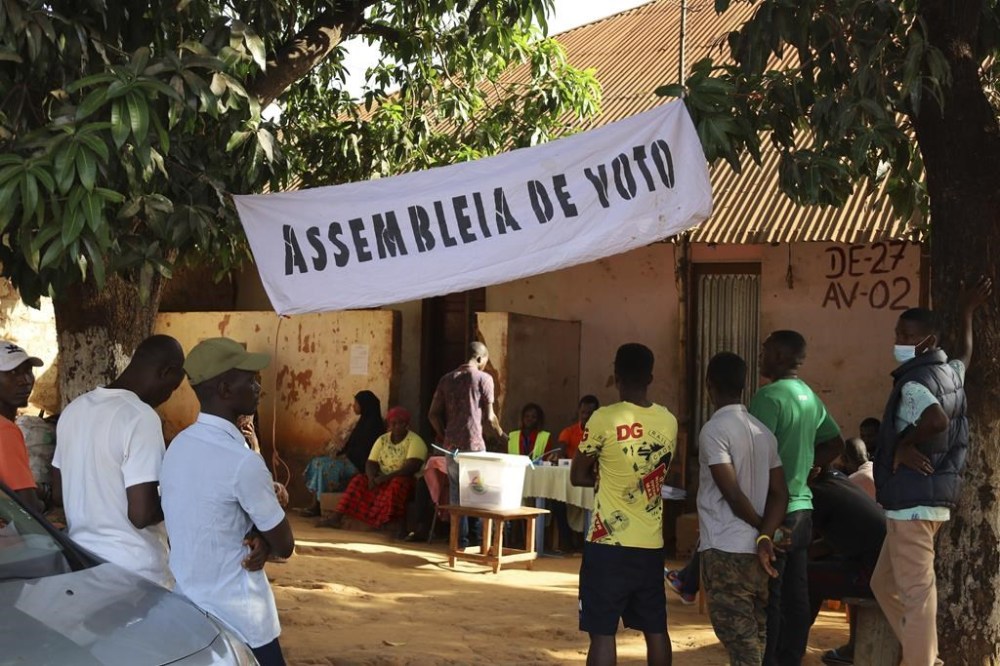Guinea-Bissau votes to elect legislature more than a year after president dissolved parliament
Advertisement
Read this article for free:
or
Already have an account? Log in here »
To continue reading, please subscribe:
Monthly Digital Subscription
$0 for the first 4 weeks*
- Enjoy unlimited reading on winnipegfreepress.com
- Read the E-Edition, our digital replica newspaper
- Access News Break, our award-winning app
- Play interactive puzzles
*No charge for 4 weeks then price increases to the regular rate of $19.00 plus GST every four weeks. Offer available to new and qualified returning subscribers only. Cancel any time.
Monthly Digital Subscription
$4.75/week*
- Enjoy unlimited reading on winnipegfreepress.com
- Read the E-Edition, our digital replica newspaper
- Access News Break, our award-winning app
- Play interactive puzzles
*Billed as $19 plus GST every four weeks. Cancel any time.
To continue reading, please subscribe:
Add Free Press access to your Brandon Sun subscription for only an additional
$1 for the first 4 weeks*
*Your next subscription payment will increase by $1.00 and you will be charged $16.99 plus GST for four weeks. After four weeks, your payment will increase to $23.99 plus GST every four weeks.
Read unlimited articles for free today:
or
Already have an account? Log in here »
Hey there, time traveller!
This article was published 04/06/2023 (904 days ago), so information in it may no longer be current.
BISSAU, Guinea-Bissau (AP) — Bissau-Guineans voted Sunday in a highly anticipated election to fill Guinea-Bissau’s national legislature, more than a year after the West African nation’s president dissolved parliament.
Nearly 1 million voters were registered to elect more than 100 lawmakers from six parties with active seats in the National People’s Assembly, according to the Centre for Democracy and Development, an African human rights organization.
Guinea-Bissau is a small nation that gained independence from Portugal nearly five decades ago. The country has endured continued political turmoil, including multiple coups, since then.

President Umaro Sissoco Embalo, a former army general, took office after he was declared the winner of a December 2019 runoff election. He survived a February 2022 coup attempt when assailants armed with machine guns and AK-47s attacked the government palace.
Since assuming office, Embalo has cracked down on civic freedoms, while government bodies have lost significant independence, according to analysts. He dissolved the parliament in May 2022 and postponed the legislative election scheduled for the following December.
Lucia Bird Ruiz Benitez de Lugo, director of the West Africa Observatory at the Global Initiative Against Transnational Organized Crime, said that Embalo has consolidated his grip on power since his controversial inauguration in February 2020.
“These elections are key in determining how much support the ruling party retains in parliament,” she said. “They will shape how isolated, or otherwise, the president, who has strained relations with the powerful military, will be during the remaining 18 months of his tenure.”
Polls opened early Sunday with more than 3,500 voting stations expected in the country and the diaspora. This is the country’s seventh legislative election since opening a multi-party system nearly three decades ago.
Citizens hope this vote will help set the country on the right path.
“This is a decisive election for the country, given the situation in which the country finds itself at the moment. Everyone is witness to the difficulties experienced,” voter Justino dos Santos Leguissimo said.
Others were thankful that they were able to vote at all.
“Today is a very special day for all Guineans, because we have finally come to exercise our civic rights again,” said Eunice Mafalda Lopes Queita Esteves, who cast her vote.
Results from Sunday’s election were expected to be contested after the results are announced in the coming days.
___
Sam Mednick reported from Dakar, Senegal.
___
Follow all of AP’s coverage from Africa at https://apnews.com/hub/africa

